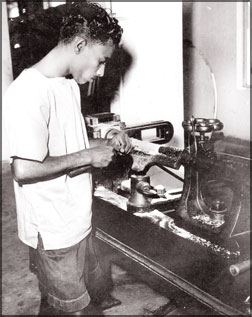Technical education, a must
When Peoples Alliance government took the initiative to establish
Sri Lanka Institute of Advanced Technical Education (SLIATE) in 1995,
Prof. Wiswa Warnapala was Deputy Minister of Higher Education. The
minister shared his views on technical education in a recent speech.
In the context of the economic changes that were taking place in Sri
Lanka, the country wanted to take the initiative to devise policies to
meet the scarcity of trained technological manpower for the purpose of
accelerating the process of economic development in the country.
|

We need to create more and more opportunities |
The SLIATE enjoys the right to establish Advanced Technological
Institutes (ATI) in every province, and it, at present, manage 12 such
Institutes, catering to nearly 3000 students who enter the different
courses with GCE A/L qualifications. With the establishment of this
Institute with its branches, access to higher educational opportunities
has been expanded; the expansion of access is the major challenge before
the Government.
For instance, the number of students who sat the Advanced Level in
2008 stood at 293,819 out of which 131,000 have been qualified to enter
the Universities. What the system can absorb is within the range of
20,000 and this means that nearly 110,000 students are left out of the
system.
This is a waste of both intellectual resources and human capital. It
is in this context that the expansion of Technical education became
relevant; we need to create more and more alternative educational
opportunities so that the ever-growing number of secondary school
leavers could be trained for jobs available in a highly competitive job
market.
I would like to refer to the finances of the SLIATE, which, for both
recurrent and capital expenditure, spends nearly 180 million and 123
million respectively for the year 2006. By conducting fee-levying
courses, it has earned 15.8 million.
Since the establishment of the Institute, it received no foreign
assistance to upgrade its courses, specially the Higher National Diploma
in Engineering program, which, in the last several years, has become an
attractive course of study.
The Government, with a view to modernizing this program of studies,
decided to obtain foreign assistance to upgrade the infrastructure at
Mattakkuliya and Labuduwa Institutes and they are to be developed as
regional centres of excellence.
The aim, therefore, is to produce high level technicians who can find
employment both here and abroad; the opportunities based on
employability are to be expanded, and it proposes to introduce new
courses in such areas as Megatronics, Marine Technology, Textile
Technology, Highways and Telecommunication Engineering. It would be
useful to refer to the nature of enrollment for different courses, and
the following are the details.
In addition to the existing centres throughout the country, the
SLIATE proposes to establish three more new centres at Tangalle,
Ratnapura and Vavuniya.
The main aim is to expand the access and diversify the system of
higher education in the country; access to higher educational
opportunities can be expanded through a planned expansion of the
Institute, which can meet the multiple demands of economic development
of the country by producing the right type of skilled personnel.
Several types of non-University institutions have developed in
various countries, and advantages, which it offers, need to be taken
into consideration in formulating the Sri Lankan strategy in the field
of higher education.
Many non-University institutions offer training programs that can
respond to labour market demand in a given country, and this is why we
propose to encourage more and more multi-disciplinary programs in
various technical fields as such programs could produce the type of
skilled labour demanded in a changing market economy. |





